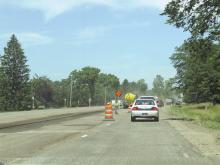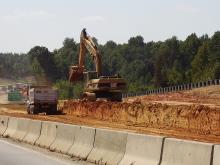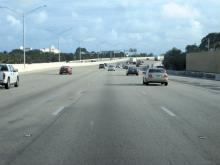America’s federal highway trust fund faces running out of money in 2015: a move that will have a “devastating impact” on states that rely heavily on federal funds for their road maintenance and construction needs, transportation officials warned the US Congress this week. Highway contractors, state transportation officials and the U.S. Chamber of Commerce all went to Washington this week to lobby Congress, arguing for a rise in the rate of federal gasoline tax to help boost the coffers.
America’s federal highway trust fund faces running out of money in 2015: a move that will have a “devastating impact” on states that rely heavily on federal funds for their road maintenance and construction needs, transportation officials warned the US Congress this week. Highway contractors, state transportation officials and the U.S. Chamber of Commerce all went to Washington this week to lobby Congress, arguing for a rise in the rate of federal gasoline tax to help boost the coffers. If the lawmakers agree, it would be the first federal fuel tax hike in the USA for 20 years.
The crisis in US transportation funding has brought the Democrat and Republican parties together in the past, but today they are deeply divided over fiscal policy, especially on the issue of using higher taxes to fund infrastructure. The problems go deeper than party politics however for Senator Barbara Boxer from California, chair of the Senate Environment and Public Works Committee. “We have to act,” she told reports in Washington last week. “The country is counting on us.”
Normally, the fund spends about $40 billion a year on highway and transit programs across the states. But, today, the Congressional Budget Office is predicting no money will be left at all by 2015. “We are facing an epic crisis,” Greg Cohen, president and CEO of the American Highway Users Alliance, told the Senate committee. California, for example, could lose all but $18 million of the $3.5 billion a year it counts on.
According to the American Association of Highway and Transportation Officials, such a reduction would stop work on hundreds of state-sponsored road projects, including a $95 million pavement rehabilitation on Interstate 80 in Sacramento County. And without those federal funds, the group said, California’s own highway fund could go broke soon after. Congress hasn’t touched the 18.4-cents-a-gallon federal gasoline tax that supports the highway trust fund since 1993.
Inflation has eroded the fund’s buying power over time and the recession has forced drivers off the roads, leading to a further fall taxes collected at the pump. The national fund “will go bankrupt a year from now,” said Michael Lewis, director of the Rhode Island Department of Transportation and president of the American Association of State Highway and Transportation Officials. To prevent this happening, the lobbyists want the fuel tax to be increased by at least 10 cents a gallon and indexed to inflation. “We all agree that we have to pay more,” Cohen told the senate committee.
The crisis in US transportation funding has brought the Democrat and Republican parties together in the past, but today they are deeply divided over fiscal policy, especially on the issue of using higher taxes to fund infrastructure. The problems go deeper than party politics however for Senator Barbara Boxer from California, chair of the Senate Environment and Public Works Committee. “We have to act,” she told reports in Washington last week. “The country is counting on us.”
Normally, the fund spends about $40 billion a year on highway and transit programs across the states. But, today, the Congressional Budget Office is predicting no money will be left at all by 2015. “We are facing an epic crisis,” Greg Cohen, president and CEO of the American Highway Users Alliance, told the Senate committee. California, for example, could lose all but $18 million of the $3.5 billion a year it counts on.
According to the American Association of Highway and Transportation Officials, such a reduction would stop work on hundreds of state-sponsored road projects, including a $95 million pavement rehabilitation on Interstate 80 in Sacramento County. And without those federal funds, the group said, California’s own highway fund could go broke soon after. Congress hasn’t touched the 18.4-cents-a-gallon federal gasoline tax that supports the highway trust fund since 1993.
Inflation has eroded the fund’s buying power over time and the recession has forced drivers off the roads, leading to a further fall taxes collected at the pump. The national fund “will go bankrupt a year from now,” said Michael Lewis, director of the Rhode Island Department of Transportation and president of the American Association of State Highway and Transportation Officials. To prevent this happening, the lobbyists want the fuel tax to be increased by at least 10 cents a gallon and indexed to inflation. “We all agree that we have to pay more,” Cohen told the senate committee.








